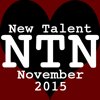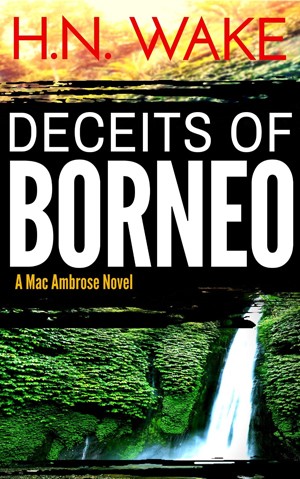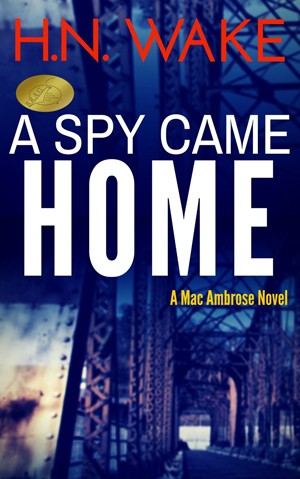

HN Wake is a pseudonym. The author used to be a US government employee and it seems possible she’s got the inside track on spying and intelligence… but we have no firm proof of what she did before becoming a writer. She creates characters like Mac Ambrose, a female spy, and she enjoys researching and tackling some key social, political and environmental issues. Her first novel was A Spy Came Home and the new one, Deceits of Borneo, will be coming out for Kindle this month. So we asked her to join us for some New Talent November action, and to tell us more about her writing…

What will crime fiction lovers love about Deceits of Borneo?
At its core, Deceits of Borneo is a murder mystery with a spy as the main character. A colleague of hers goes missing in the jungles of Malaysia and her investigation starts to unravel a sinister conspiracy. It has a complex plot with a pace that ticks along nicely. And since I read crime fiction, I also know readers appreciate believable characters and motives. This isn’t your typical James Bond thriller. In fact, I’ve had readers tell me they would never pick up a spy thriller, but really liked the first Mac Ambrose novel.
This is your second Mac Ambrose novel and there’s a novella too. What draws you to Mac as a character?
I wanted a character who was real. I wanted it to be a woman with grit, a strong sense of ethics, and a real strategic way of thinking who is thrown into less than ideal situations. As a reader, I love to be kept guessing. As a writer, it’s a fun challenge to deliver that anticipation. When you have a smart protagonist, like Mac, you can credibly have her making smart choices and clever predictions. It’s exciting to write about a tactician.
Mac also has vulnerabilities. She’s had a tough childhood that has made her adept at reading others, but also afraid of intimacy. I like authentic characters, and I firmly believe people can be strong but vulnerable at the same time. And I’ve always been drawn to reluctant heroes.
Mac’s had adventures in Macau, Hong Kong, and Malaysia. What drew you to these exotic settings?
I spent a lot of time in Asia in my career. It’s a fascinating and diverse region. So many cultures, politics, and environments. When I’m there, my senses are on high alert: the sounds, the smells, the colours all resonate boldly. It made writing about them easy. And I agree with you, they are exotic and great to sink into!
Why did you choose to have a woman spy as your protagonist?
I never thought to write about a male protagonist. I don’t know why, I just never did. And when I started examining the suspense/thriller market from a writer’s perspective, I realised there are very few – authentic, not cartoonish – female spies. Loads of gritty, real male spies, but not so many females. I found that curious. What I found remarkable was that a significant number of reviewers and critics of the top thrillers are men. That gave me pause. I’m not sure what it means, but it does make you wonder.
Does Deceits of Borneo have a larger theme?
When I start noodling a book, the first thing I look at are issues that really irk me, ones around which I have some passion. Then I start imagining what Mac would do if we dropped her in it. My first two novels have larger themes and my third, which is half-way completed, does as well. I’d say there are three larger themes that run through all my books. First, I use a political issue as backdrop (much like Stieg Larsson or Richard North Patterson). My first novel took on the corrupt gun lobby and manufacturing sector. This second novel takes on the role of banking in environmental destruction.
Second, there is Mac’s approach. I want her to outwit, not out-gun, the antagonist. She’s definitely brain over brawn. That’s a pretty constant theme.
Third, I can’t help but have a female perspective. It comes out in my writing. I try to use gender neutral word choices and so far I’ve had men and women like my work equally, but Mac’s motives and actions are authentically female.
For Deceits of Borneo the theme of deception also runs through the novel. As the story rolls out, we start to wonder if Mac is the only one we can really trust. These layers of deception mess with Mac’s sense of self and her loyalties.
The promotional copy for two of your novels says they could only have been written by an insider. Does that mean you’re a former CIA employee?
I’m going to have to give a no-comment on this one. Apologies.

Your first book, A Spy Came Home, deals with gun control – a divisive topic in the US – and some readers have called it polemical. Did you expect such a strong response?
I did a lot of research for A Spy Came Home. I wanted to get the subject right. In the end I knew the research was solid but when I hit ‘publish’ I really didn’t know if the story was a hunk of junk or not. I suspect a lot of writers have this insecurity.
Any time someone takes the time to read your book, let alone review or star it, you are incredibly grateful. I’ve had some really amazing people reach out with their support, both in terms of the hot button issue and my decision to be a writer. My husband has seen me shed a tear of happiness over some of those emails. Corny but true. There’s nothing like that kind of reassurance when you have big doubts. Conversely, when I interviewed activists in the gun violence space, they warned me about the vitriolic nature of the more extreme gun fanatics. I knew the negative was coming. Let me just say, I believe in free speech. It’s what has allowed me to write and publish books.
I certainly don’t like the horrible trolling, but you have to move beyond that. On my mirror, I’ve hung a Ron Bell quote: “If it is true, if it is beautiful, if it is honorable, if it is right, then claim it.” A Spy Came Home, while fictional, is a true reflection of the gun manufacturing sector in America at the moment. I am proud of the novel: the backdrop is real but the story is entertaining. I mean, who doesn’t want a spy to take down a gun lobby? So, I claim it proudly.
Tell us more about the issue you tackle in Deceits of Borneo.
Deceits of Borneo lays out the true role of international finance in the destruction of virgin rain forest in Malaysia and Indonesia. It’s another hot button issue, but I doubt this will have as many vocal critics as my first novel. And the story takes place when Mac is young and first starting out with the CIA. In fairness, most of the big international banks have gotten better about their environmental policies and practices. But I did a deep dive with research, and I think I’ve gotten a life-like depiction of what happens in a bank in terms of how these decisions are made.
HN Wake is a pseudonym. Did you use initials instead of a full name to make the book more market-friendly for both men and women?
You’re right. I didn’t want my gender influencing readers one way or the other: I would like to think my books stand on their own feet – or is it legs? And my pen name is a very respectful nod to an amazing British spy during WWII named Nancy Wake.
If you like the sound of Mac Ambrose and the issues she tackles, you might also enjoy the Edie Kiglatuk novels by MJ McGrath, set in Arctic Canada.










This is a great and informative interview of an up and coming new author. I have read both her novels and her novella and they are outstanding. I urge all readers of crime/thrillers and all those who care about these controversial issues to give her works a try.